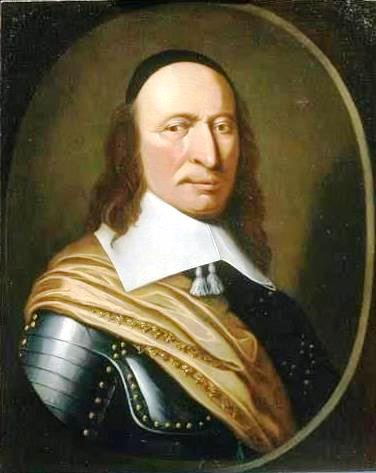 Governor Peter Stuyvesant of New Amsterdam opposed the settlement of Jews in the colony, but was overruled by his superiors in Holland
Governor Peter Stuyvesant of New Amsterdam opposed the settlement of Jews in the colony, but was overruled by his superiors in Holland Shortly after his arrival, a party of 23 Jews arrived in New Amsterdam aboard a Portuguese vessel that had been diverted from its planned return to Europe by a pirate attack. Unlike Barsimon, who had a passport from the Dutch West India Company, these arrivals were not welcomed by the local officials, who viewed them as a corrupting influence in the Christian colony. Nonetheless, Jews came from the West Indies, heavily dominated by Catholic Spain, and Brazil, where the former Dutch colony had been lost to the Portuguese, because they were disillusioned with the religious and political situations that existed there. The Jews settling in New Amsterdam were seeking the equality of free men in a land of liberty where they could freely worship and have equal opportunities and obligations alongside the Christian citizens.
In 1655, Barsimson and another early Jewish settler, Asser Levy, joined in a petition to Governor Peter Stuyvesant and council of New Netherland to be permitted to stand guard like the other burghers, or to be relieved from the special tax imposed upon their nation in lieu thereof by resolution of governor and council, but their request was curtly refused with the remark that they might go elsewhere if they liked. Instead of following the latter advice, Barsimson and other early American Jews succeeded before long in obtaining instructions to Governor Stuyvesant from his superiors, the Dutch West India Company, condemning such unjustified and illiberal discriminations.
Despite this victory, Barsimon and the other members of the Jewish community continued to suffer prejudice at the hands of the local authorities, obtaining relief only when Jewish leaders in the Netherlands applied pressure to the governors of the Dutch West India Company, who were heavily dependent on Jewish bankers and investors to finance their operations, to permit the New Amsterdam Jews to have certain rights including the ability to purchase their own burial plot.
In 1658, Barsimson succeeded in securing from the Dutch municipal court in New Amsterdam a ruling which is surprising even in the light of latter-day principles of religious liberty. He was summoned to court as defendant on a Saturday, but the court decided, in the terse language of the record that "though defendant is absent, yet no default is entered against him, as he was summoned on his Sabbath."
 RSS Feed
RSS Feed